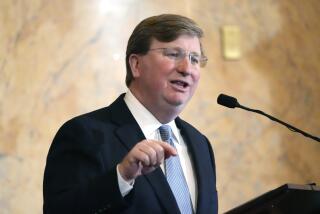States pressed to guarantee Medicaid expansion
- Share via
WASHINGTON — The Obama administration stepped up pressure on states Monday to guarantee insurance for all their low-income residents in 2014 under the new healthcare law, warning governors that the federal government would not pick up the total cost of partially expanding coverage.
“We continue to encourage all states to fully expand their Medicaid programs and take advantage of the generous federal matching funds to cover more of their residents,” Health and Human Services Secretary Kathleen Sebelius wrote in a letter to governors.
But Sebelius indicated that governors who do not open their Medicaid programs to all eligible low-income residents would forfeit some of the federal aid promised by the Affordable Care Act.
“The law does not provide for a phased-in or partial expansion,” the Department of Health and Human Services said in guidance accompanying Sebelius’ letter.
Medicaid has become a major issue in the implementation of the law since the U.S. Supreme Court ruled in June that states can decide whether to expand their Medicaid programs in 2014.
The law originally required the states to open Medicaid to all Americans who earn less than 138% of the federal poverty level, a major change for a program that now largely covers poor children and mothers.
To ease the expansion, the law initially provides full federal funding to cover the new population. Currently, Medicaid costs are split between state and federal governments.
Nonetheless, several Republican governors have said they won’t expand Medicaid, citing cost concerns. That prompted speculation that some states might partially expand Medicaid programs. But Obama administration officials said Monday the law did not authorize full federal funding for a more limited expansion.
A state that opens Medicaid to only some new low-income residents would qualify for reduced federal aid, requiring the state to come up with the remainder of the funding.
How the guidance will affect state decisions remains unclear.
Alan Weil, president of the National Academy for State Health Policy, said state leaders probably would not make final decisions until they worked out 2014 budgets next year. “A lot of what we have seen so far is posturing,” he said.
But the administration’s announcement drew quick criticism from the Republican Governors Assn.
“The Obama administration’s refusal to grant states more flexibility on Medicaid is as disheartening as it is short-sighted,” said Louisiana Gov. Bobby Jindal, the group’s chairman. Jindal has said he will not expand Medicaid in his state.
In contrast, the administration’s move was applauded by the National Assn. of Public Hospitals and Health Systems, whose members care for millions of the nation’s uninsured, often without compensation. Dr. Bruce Siegel, the association president, said it “takes an important step toward significantly reducing the ranks of the uninsured.”
The Obama administration is facing additional resistance from several Republican governors who have said they won’t set up insurance exchanges — a cornerstone of the law that will allow Americans who don’t get health benefits at work to shop for insurance plans that meet new minimum standards. The federal government can set up exchanges for states that refuse to do so.
Also Monday, Colorado, Connecticut, Massachusetts, Maryland, Oregon and Washington got conditional federal approval to operate their own exchanges. The six were the first to apply, and administration officials said approval for other states, including California, would probably follow.
More to Read
Sign up for Essential California
The most important California stories and recommendations in your inbox every morning.
You may occasionally receive promotional content from the Los Angeles Times.











